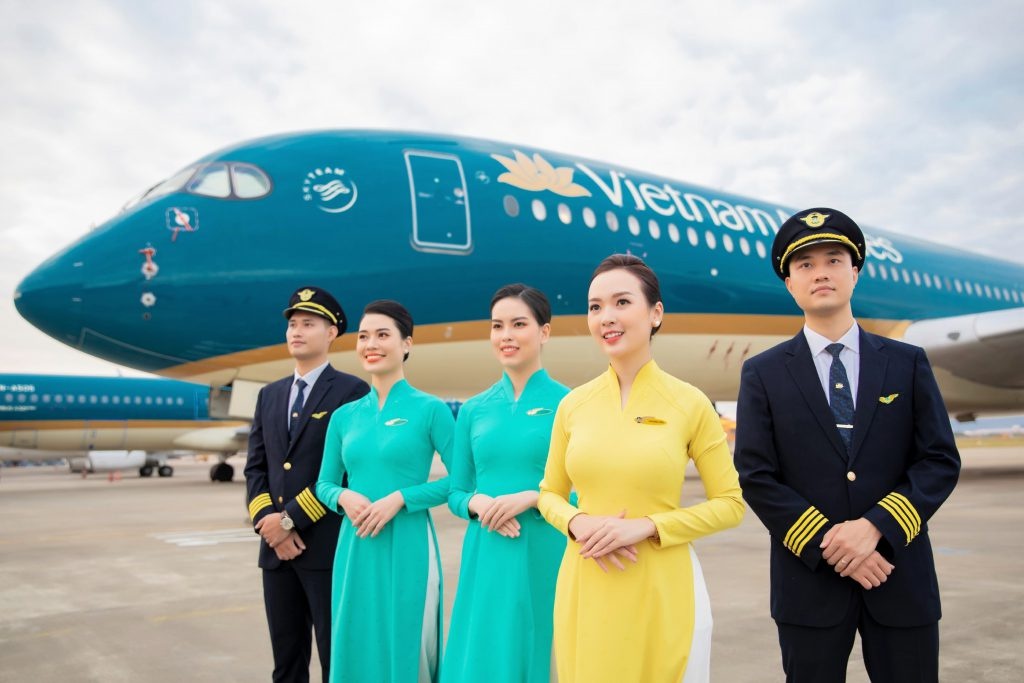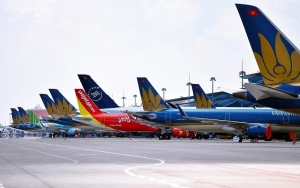Vietnam Airlines faces severe aircraft shortage, considers Chinese planes
 |
“The aircraft shortage caused by engine issues – the main factor driving up ticket prices – may not ease until the end of next year,” stated CEO Le Hong Ha at Vietnam Airlines Corporation's AGM on June 21. “The challenge for many airlines at present is the severe shortage of aircraft, significantly impacting their operational and expansion plans.”
He explained that the root of this shortage lies in global supply chain disruptions, stringent controls on major aircraft manufacturers like Boeing, and the recall of Pratt & Whitney engines on A321 and A320 NEO aircraft.
Globally, over 1,500 aircraft have been affected by the recall, with 340 grounded. Vietnam Airlines has 11 aircraft impacted and anticipates grounding an additional six by year-end.
Pratt & Whitney plans to recall over 3,000 engines this year, with repairs and maintenance extending up to 250-300 days. Consequently, the aircraft shortage is expected to persist through 2024 and gradually ease by 2025.
“Vietnam Airlines is facing significant operational challenges due to the grounding of these aircraft,” Ha added.
According to Nguyen Quoc Ky, chairman of Vietravel Corporation, which operates in both the aviation and tourism sectors, the Vietnamese market is short of about 45-50 aircraft across Vietnam Airlines, Vietjet, and Bamboo Airways. The market comprises roughly 270 aircraft. Despite the reduced capacity, demand has surged as people seek to travel post-pandemic, desiring faster, safer, and more seamless journeys.
According to Ha, to address this, Vietnam Airlines has devised two main strategies.
Firstly, Vietnam Airlines has engaged with Pratt & Whitney to secure spare engines and expedite repair schedules for the affected engines. Additionally, the airline has reduced flight frequencies on less profitable routes to concentrate its resources on primary routes.
The airline has also increased the flight hours of its fleet by 15-20 per cent, partially offsetting the aircraft shortage. Furthermore, Vietnam Airlines has postponed the sale of six A321CEO aircraft to meet current demand.
Secondly, Vietnam Airlines is considering the C919 aircraft developed by China. The airline revealed plans to incorporate this aircraft into its fleet in the near future.
The global aircraft shortage is expected to continue until 2027, with new orders from Airbus or Boeing unlikely to be delivered before 2030. Leasing additional A321 aircraft poses challenges, as highlighted by Ha.
Vietnam Airlines is currently experiencing unprecedented financial difficulties. The airline's accumulated losses by the end of 2023 totalled VND41 trillion (approximately $1.64 billion), far exceeding its charter capital, resulting in negative equity of over VND17 trillion (approximately $680 million). Short-term debt surpassing short-term assets by VND46.287 trillion (approximately $1.85 billion) has exacerbated the financial imbalance.
The airline's leadership anticipates a challenging cash flow situation in 2024, with numerous restructured debts maturing, particularly from July 2024 when refinancing loans are due.
Despite these challenges, Vietnam Airlines projects a revenue of nearly VND106 trillion (approximately $4.24 billion) in 2024, a 13.6 per cent increase on-year, potentially marking a record in the company's history. The airline also forecasts a post-tax profit of over VND4.233 trillion (approximately $169.32 million), with the parent company contributing VND105 billion (approximately $4.2 million). Planned total investment costs are VND284 billion (approximately $11.36 million), including VND 71billion (approximately $2.84 million) for asset investments and VND283 billion (approximately $11.32 million) for investment provisions.
At the AGM, Dang Ngoc Hoa, chairman of Vietnam Airlines, expressed the company's ambition to eliminate negative equity by 2025, gradually recover accumulated losses, and restore financial health to pre-COVID-19 levels. He emphasised the importance of internal solutions, although state support will also play a role.
The company has outlined a capital increase plan, seeking approval from relevant ministries and agencies. The capital increase may be executed through either a rights issue to existing shareholders or a private placement to investors. This capital increase aims to bolster operating cash flow, ensure long-term funding, and reduce costs by minimising additional borrowing.
 | Several factors affecting aviation sector recovery Pacific Airlines has recorded zero passengers since the start of April after the budget airline returned its last aircraft at the end of March in an attempt to write off debts, perfectly encapsulating the ongoing struggles of businesses operating in the aviation sector. |
What the stars mean:
★ Poor ★ ★ Promising ★★★ Good ★★★★ Very good ★★★★★ Exceptional
Related Contents
Latest News
More News
- Visa data highlights five key payment and travel trends in Vietnam for 2026 (January 14, 2026 | 10:42)
- New Year tourism receipts top $40m in key cities (January 06, 2026 | 08:36)
- Vietnamese passport climbs on global ranking (December 16, 2025 | 08:00)
- Manila becomes a new check-in destination for Vietnamese youth (December 11, 2025 | 18:07)
- Vietjet launches mega year-end ticket promotion (December 10, 2025 | 11:33)
- Dalat leads Vietnam’s 2025 search trends (December 09, 2025 | 13:44)
- Vietnam welcomes record wave of international visitors (December 09, 2025 | 13:43)
- Vietjet launches daily Manila flights to celebrate year-end festive peak season (December 05, 2025 | 13:47)
- The destinations powering Vietnam’s festive season travel demand (December 04, 2025 | 18:33)
- Vietnam named among the world’s most exciting winter destinations (December 04, 2025 | 15:10)

 Tag:
Tag:



















 Mobile Version
Mobile Version